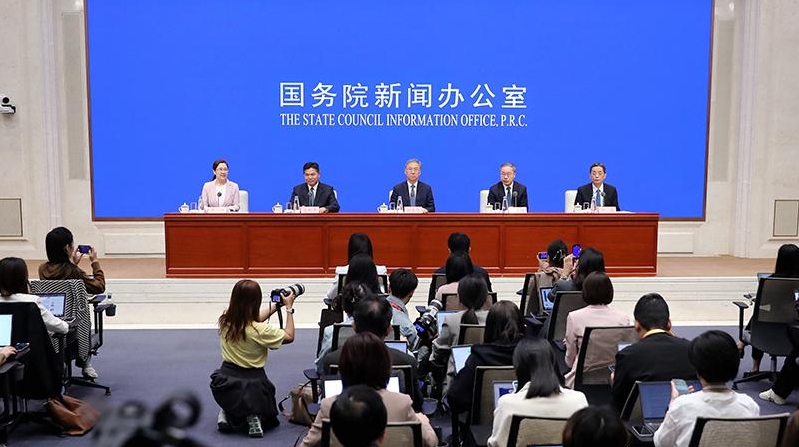Yicai:
This year, General Secretary Xi Jinping presided over a symposium on private enterprises, pointing out the direction for and strengthening confidence in the development of private enterprises. Recently, the China-U.S. trade war has re-escalated, bringing new problems and challenges to the development of private enterprises. What policy arrangements has the PBC made in terms of financial support for the development of private enterprises? Thank you.
Zou Lan:
Thank you for your question. I will answer this one. In recent years, the PBC, in accordance with the arrangements of the CPC Central Committee and the State Council, has worked unswervingly both to consolidate and develop the public sector and to encourage, support and guide the development of the non-public sector, actively improved the policy framework, promoted the construction of financial service capabilities, improved the incentive and restraint mechanisms, and strengthened supervision and implementation, providing strong financial support for the high-quality development of the private sector.
First, the guiding role of policies has been strengthened. We have successively organized symposiums and promotional meetings on financial support for the development of private enterprises, and introduced 25 measures to boost financial support for the private sector. These measures have guided financial institutions to adhere to the principle of "equal treatment," eliminate ownership discrimination, and enhance the sense of gain and satisfaction of private enterprises in financial services. To effectively respond to the impact of tariff changes on foreign trade enterprises, financial institutions have been encouraged to increase financial support for private foreign trade enterprises in accordance with market-oriented and law-based principles.
Second, incentives and constraints have been strengthened. We have comprehensively utilized a range of monetary and credit policy tools such as re-lending for supporting agriculture and small businesses across all stages of bank credit services, established and improved mechanisms for policy guidance and funding support, conducted quarterly policy effect evaluations, and urged financial institutions to increase support for private enterprises.
Third, collaboration between departments has been strengthened. Focus has been given to coordination between financial, fiscal and industrial policies. While increasing financial supply, we have guided private enterprises to operate in a lawful, compliant and good-faith manner and improve financing support mechanisms. This approach has ensured that various policies worked in the same direction and formed synergy, so that more financial resources would be guided to flow to small and micro enterprises and private enterprises. As of the end of March 2025, the outstanding loans of privately owned enterprises amounted to approximately 45 trillion yuan, with an increase of 2.4 trillion yuan in the first three months. The number of privately owned enterprises that were granted credit lines exceeded 8 million, up 7% year on year. The weighted average interest rate of new loans issued to privately owned enterprises in March was approximately 3.41%, down 58 basis points from the same period last year.
To address new difficulties and challenges, going forward, the PBC will mainly focus on the following aspects to continue improving financial services for private enterprises:
First, we will continue to increase the input of financial resource elements. We will implement a moderately easy monetary policy and maintain adequate liquidity to create a sound monetary and financial environment for the development of private enterprises. We will continue to work on implementing the 25 measures to provide the private sector with financial support, and gradually increase the proportion of loans to private enterprises. We will make good use of structural monetary policy tools such as re-lending for sci-tech innovation and technological transformation, focus on areas such as science and technology, green and low-carbon development, and consumption promotion to increase financial support for private enterprises. We will urge financial institutions not to rashly withdraw, cut off or defer loans and to actively meet the reasonable funding needs of private foreign trade enterprises.
Second, we will take targeted measures to broaden the diversified financing channels for private enterprises. We will leverage the instruments supporting private enterprises in debt financing to expand the scale of debt financing by private enterprises. We will launch debt financing tools to promote equipment upgrades and consumer goods trade-ins, supporting private enterprises and other entities in bond financing. We will make good use of re-lending facilities for share repurchases and increases to meet the funding needs of private listed companies for market value management. We will improve policies to facilitate cross-border investment and financing to enhance the efficiency of private enterprises in utilizing foreign capital.
Third, we should make greater efforts to promote the improvement of supporting mechanisms for private enterprise financing. We should fully promote the application of the national SMEs capital flow credit information sharing platform, establish a credit enhancement system for private SMEs, and solve the financing constraints such as insufficient credit and information asymmetry for private SMEs. We should continue to strengthen the coordination of financial, fiscal, and industrial policies to jointly create a better development environment for private enterprises. Thank you.
Shou Xiaoli:
Due to time constraints, this will be the last question.


 Share:
Share: 




 京公网安备 11010802027341号
京公网安备 11010802027341号